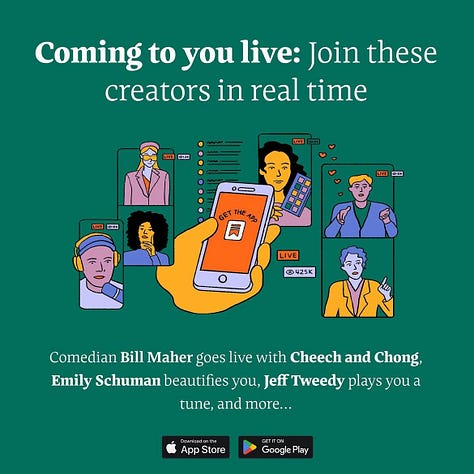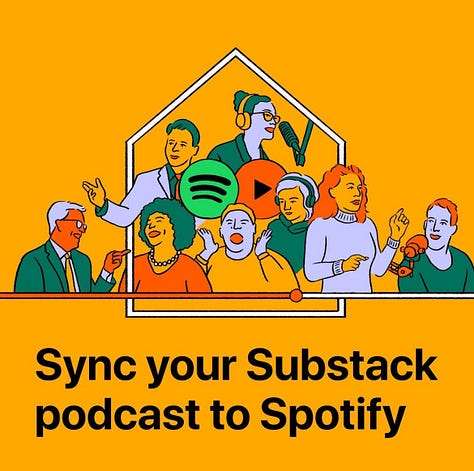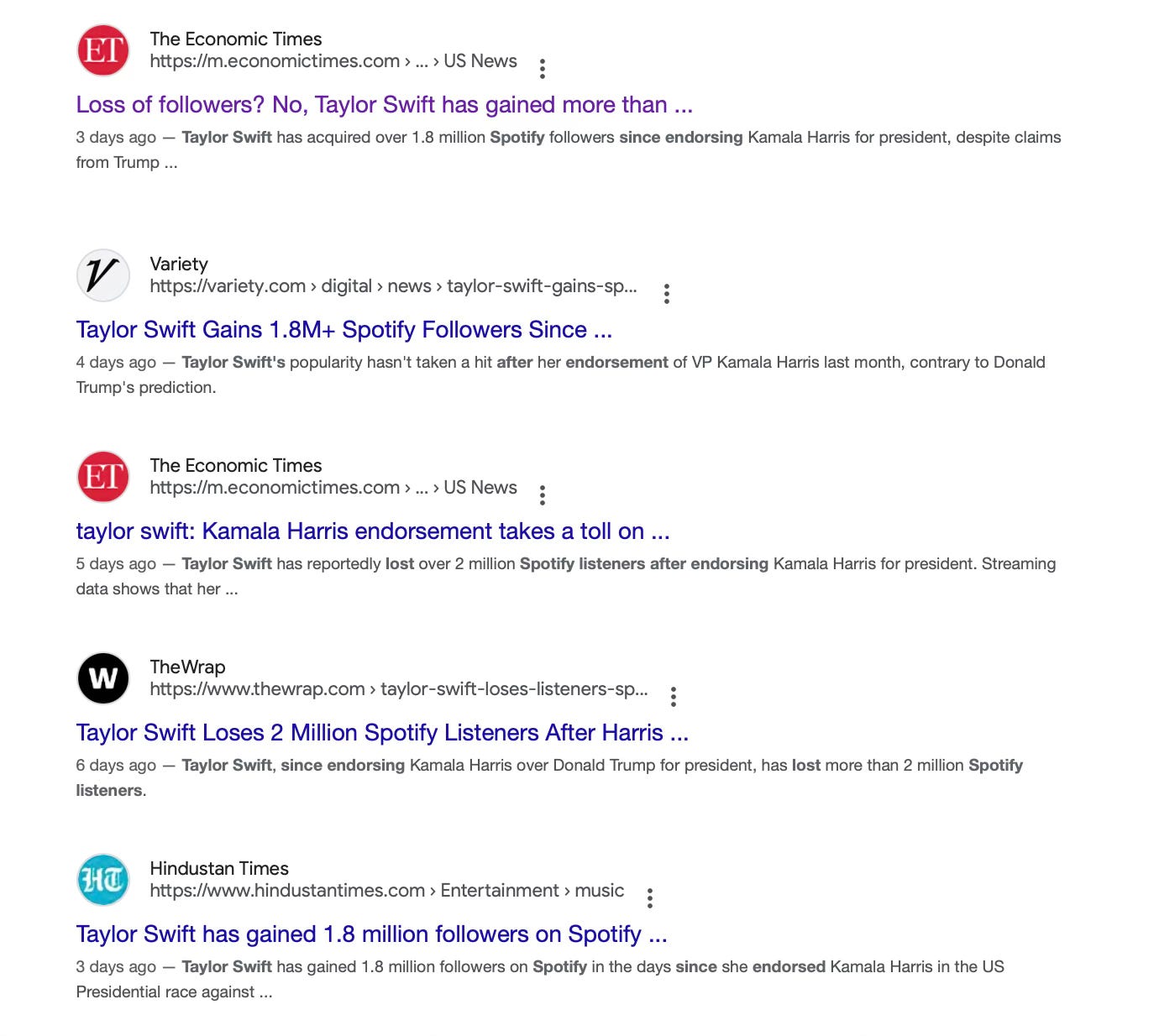the worst thing to be on substack is a substacker
plus, off with alex cooper's head
wrote two mini essays today because the news cycle gave me nothing and I had loads to say about two things in particular. deviating from my format makes me want to cry, so hopefully this won’t be a regular occurrence.
Excuse Me As I Enter The Substack Discourse Chat
The fun thing about being early to a platform is that you really get to see it evolve. Back in May, when I first joined Substack, I would have described it as a sort of Tumblr 2.0 meets independent journalism. I’d never gotten into Medium, Twitter, or even Tumblr, but Substack felt like a chance to relive their best parts. A few months in, two things are clear: Substack the business is evolving, and Substack the platform is facing an identity crisis.
Some Substackers see themselves as writers, while others see themselves as creators. I used to think that depending on where you fell along that spectrum, you’d either be super enthusiastic or enthusiastically opposed to the new updates positioning Substack as a social media competitor. With each update, my Notes feed (ironically) filled with early users lamenting what they rightly perceived as the end of an era. Substack had been sold to them as a literary utopia that promised good vibes and quality writing, no gimmicks and minimal self-promotion needed. Now that things were changing, there were simmering feelings of betrayal and panic. This was also the first time I noticed how far-reaching the influence of Instagram’s algorithm was. Because even though anyone could technically opt out of using these features, we’d by now been trained to believe the algorithm would reward those who engaged with new features and penalize those who didn’t.
Along with the introduction of social-first features, there’s been an influx of “creators” on Substack—influencers, founders, podcasters, and YouTubers—with little writing experience (non-derogatory) but huge audiences that Substack hopes they can bring over and convert to paying subscribers. This cohort has been welcomed with open arms by Substack the business, but met with skepticism from Substack the platform in a way that’s somewhat emblematic of the tensions that exist. It’s fascinating, isn’t it? The dynamics between early adopters and new users as a startup evolves and expands.
I had assumed that it was the career writers—the authors and journalists—who would be most against the new updates. I was wrong. Most of the top-grossing Substacks across different categories are run by former journalists who are well-versed in being both writers and creators and have embraced Substack’s features pretty readily. They understand that to get the most out of a platform, you’re probably going to have to utilize all it has to offer and do it strategically. If they’re particularly savvy at doing this, I can only assume years spent working in an industry that, to some extent, required them to be both writers and influencers has prepared them for this day. Not just in skill, but in flexibility. Almost all of my favorite Substackers with traditional media backgrounds have hosted live events, recorded podcasts, and regularly engage with notes. It’s fun!



Now, read carefully, because I want you to understand what I’m trying to explain here. On Substack, you have the Creators, the Writers, and then you have people like me who don’t identify as either of those things. I’d argue that this category makes up the majority of the platform. I work in Sports, and one of the most interesting things I’ve learned about the "running market" is that the biggest chunk of it doesn’t even consider themselves runners. Millions of people go on runs pretty regularly and buy running shoes maybe once or twice a year. Only a small segment of those millions self-identify as runners. Most people writing on Substack don’t even identify as writers. Instead, they identify as Substackers (definitely non-derogatory), a term that carries its own baggage and implications.
Substackers write across various categories but are united by the fact that, while they don’t have established writing careers, writing is the medium they love to create and engage with. Being a Substacker, rather than a writer, is less about writing itself and more about self-identification, which has everything to do with confidence and a some to do with gatekeeping. That is to say, I believe a lot of Substackers would identify as writers if they thought they could. But there’s something about this platform (or society at large) that makes them think they can’t. Still, Substackers have a vested interest in keeping the platform as it is because, unlike the other two categories, they’re mostly not making a living off Substack. If they love Substack, the vibe has a lot to do with it. That vibe is easygoing, open, and expressive. That vibe is changing. A bit ironic, isn’t it? The thing we're most eager to preserve (the writing) is the thing we don’t feel like we can completely own (the writing). Personally, I’m very comfortable existing in this space. I'm a better writer than I was five months ago, and I’ll be a better writer in the next five months. God help the person that tries to make me feel bad about that.
Speaking with Interview Magazine, Plum Sykes, who’s readying to launch her own Substack, said, “Well, if you look at Substack, it’s a marketplace, so if you don’t edit your work very well, no one’s going to buy it. In the end, the good stuff bubbles up to the top. I also think that anyone who thinks they can start a newsletter and keep it going for years, who’s not a trained or practiced writer, is going to drop out of it pretty quickly because they don’t realize how much work it is.” I agree with exactly half of this statement. As someone whose first go at writing is with this newsletter, I’m very pro working on your craft in public. People have a range of motivations for starting Substacks, and those motivations influence the effort they put into it. It is what it is. But this idea of not being a "trained or practiced writer” and therefore not being able or willing to put in the work to make something really good is a sentiment I’ve seen expressed more than a few times. I don’t love it, but think I get it. Writing is a craft, and it’s hard. Those who have gotten good at it naturally feel protective over it. But what I can’t account for is the idea that people love the work can’t or won’t get good by honing their craft right here on Substack.
Every new platform mints new stars—people who create in a format that’s native to that platform and find success because of it. If Substack is a sort of social platform, it’s notable that there seems to be this notion that the same won’t happen here. Substack’s recommendation network is responsible for 50% of all subscriptions and 30% of paid subscriptions. It’s true that starting with an existing audience is a massive advantage, and starting from scratch is always hard, but I do see the gap between “Substackers” and everyone else narrowing in the future because the platform has truly great network effects, which I’ve seen firsthand reward quality work. Of course, the question of quality work is what’s really in question here isn’t it?
Getting to enjoy my favorite Writers and Creators in a more intimate way on Substack has been fun. As a self-identified Substacker, there’s a lot to learn from them, and I’m happy to learn it. But I’m most excited about the writing styles Substack will inspire or the ways in which what is deemed quality work will evolve because of this platform. Sometimes I ask myself, what is Substack-native content? Is it the too-personal essays, listicles, and recommendations? Is it news roundups like mine and the voicey way in which I write? Or is it the fashion Substacks waxing poetic about personal style while linking a bunch of cool fits? Who’s the new Substack-native talent this platform is going to mint? I really hope she doesn’t live in New York.
When all is said and done, here’s what you need to remember: Substack doesn’t care if your writing is basic/shit/original, as long as there are people willing to pay for it.
Off With Alex Cooper’s Head (Said Some Of You, Not Me)
Here’s my confession: until this morning, I hadn’t listened to a single Call Her Daddy episode. Sure, I’d seen TikTok clips here and there, but I’ll admit I’ve been more interested in the business of the podcast than the podcast itself. But as I was getting ready for bed last night, doomscrolling while trying to find content for the newsletter, I saw Kamala Harris take a seat behind the Call Her Daddy microphone. I texted my friend, Shit! Alex Cooper is kind of wild for this. There are many ways to read that sentence.
It’s been a big year for Alex—two national tours, expanding the Unwell Network with new talent, hosting an Olympics show with Peacock, and of course, that massive $125 million SiriusXM deal. In terms of reach, Call Her Daddy is second only to The Joe Rogan Experience and the undisputed top women’s podcast in the U.S. right now, which is huge. But as Alex herself admits in the first few minutes of the Kamala Harris episode, her listenership is diverse in a way very few podcasts of that size are. In fact, up until this morning, I couldn’t tell you with any certainty who Alex would vote for.
The fact that I think I now can is going to have implications for her brand. So why did she do it? (And I’m not speaking to the moral or civic reasons. I think those are pretty clear-cut.)
Kamala is VP and could be President. It’s a big flex. Unlike Trump, Kamala has so far stayed away from the podcast circuit. The fact that she chose to break that mold with Call Her Daddy, specifically to speak on women’s issues, is a huge cosign for the podcast. It’s like saying, if there’s one place to reach American women en masse and across the political spectrum, this is it. If people weren’t taking Alex Cooper seriously, they are now.
This episode is going to do crazy numbers. I mean, she got me to listen, right? We’ll have to wait for the stats to validate this one, but no doubt those clips will be trending on TikTok and Instagram, and every publication will have a take (guilty!). Of course, the hope is that new listeners convert to being loyal fans of the show and eventually start engaging with other podcasts in the Unwell Network, attend shows, buy merch, etc. But I can’t help wondering if this is the best way to attract that kind of audience. I can see it being a situation where they gain millions of new listeners, but only a small percentage are interested in the usual Call Her Daddy content. Still, everything is a numbers game, and a small fraction of millions is still millions, which is a huge win.
Alex gives more disclaimers than I assume she’s ever had to at the beginning of the episode: 1.) she’s not telling people how to vote, 2.) she won’t be talking about fracking—just women, and 3.) she also invited Donald Trump to the podcast; she hasn’t heard back. So, strictly speaking, Alex isn’t even endorsing Kamala Harris. I assume that little preamble is something she and her team spent hours going over. I can just picture a stupidly long email thread titled How Not To Alienate the Audience. But Americans are famous for jumping to conclusions, and a quick scroll through the comment section shows her fans did take Kamala’s appearance on the show as an endorsement. I also find it interesting that people seem to be just as mad that she’s not a Trump supporter as they are that she’s talking about politics at all. But more on that later.
Over on the Kamala side of things, starting her media blitz with a Call Her Daddy interview can only be a win. Not because I think it swayed many decisions—most of those are pretty locked in—but because it gave her an opportunity to answer different questions, and also the right kind of questions. Podcast appearances have been a big part of Trump’s strategy for a while. They’re a great way for candidates to reach different audiences and have conversations in a format that’s casual and therefore builds more trust. For some reason, podcasts are great at humanizing people. So far, Kamala’s Gen Z strategy has been as accidental as it is effective. Kamala won brat summer without ever really engaging with it. Coming on Call Her Daddy, whose demographic is the brat summer demographic, is a great way to sustain that energy while engaging with it in a more “mature” way. Because let’s be honest, Kamala using the word “brat” would have been a lot of cringe.
There’s been much talk about the widening political divide between young men and women, much of it centered around reproductive rights and women’s health in general. Focusing the conversation on sexual abuse, domestic violence, reproductive rights, and women’s issues—Kamala's strongest platforms—was a great choice. First of all, I assume there’s a sizable segment of Call Her Daddy listeners that aren’t politically engaged and might not even vote. Sticking with conversation points that are easy to understand and relate to could be just the thing to activate them. Also, it leveled the playing field so that Alex never appeared out of her depth in conversation, which made them both look good. I’ll say this: it was one of the only interviews Kamala has done where being a woman running for president didn’t force her to come from a position of weakness, but from a position of strength. That alone is a win.
So what’s the fallout going to be? Hard to say. Writing this made me realize that Alex Cooper and Taylor Swift have a lot more in common than I thought. They’re both hot, white, blonde women with absurdly large, politically diverse female audiences and (previously) socially ambiguous stances themselves. By that, I mean it has been entirely plausible at one point or another that both of them were Trump supporters. It’s also been entirely plausible that they weren’t. Either way, they’ve both benefited from existing in that politically gray area for a long time. So I guess it only makes sense to look toward the aftermath of Taylor’s endorsement to see what might await Alex. But even that is a bit hazy—some sources say Taylor has gained millions of listeners on Spotify since the endorsement, while others say she’s lost millions. My biggest takeaway, though, is that just a few weeks in, no one is talking about it anymore. People are fickle, and so is the news cycle. There’s very little on the internet that can’t be forgiven.
As for Trump, he could respond in a few ways: 1.) take Alex up on her offer and come on the show, 2.) make Alex Cooper enemy number two (after Taylor, of course), or 3.) make a Talk Tuah appearance, which is apparently now #5 on Spotify.





Sorry pal you’re a writer. Even if you don’t identify as one you write like a dream so that makes you… A WRITER ✍🏻
"When all is said and done, here’s what you need to remember: Substack doesn’t care if your writing is basic/shit/original, as long as there are people willing to pay for it." -That part.
I don't know that Plum meant people can't improve at writing/maintaining a newsletter. She most likely meant that people won't. Writing and publishing pieces every week, every other week, takes immense stamina. You've got to LOVE it. Those who feel neutral about it won't make it past year 2. The prominent creators/influencers from different platforms will likely have someone else write for them. I'm with you. I'm interested in seeing where the writing style goes, and I'm ecstatic there is a place to go online that doesn't involve TikTok or Instagram reels.